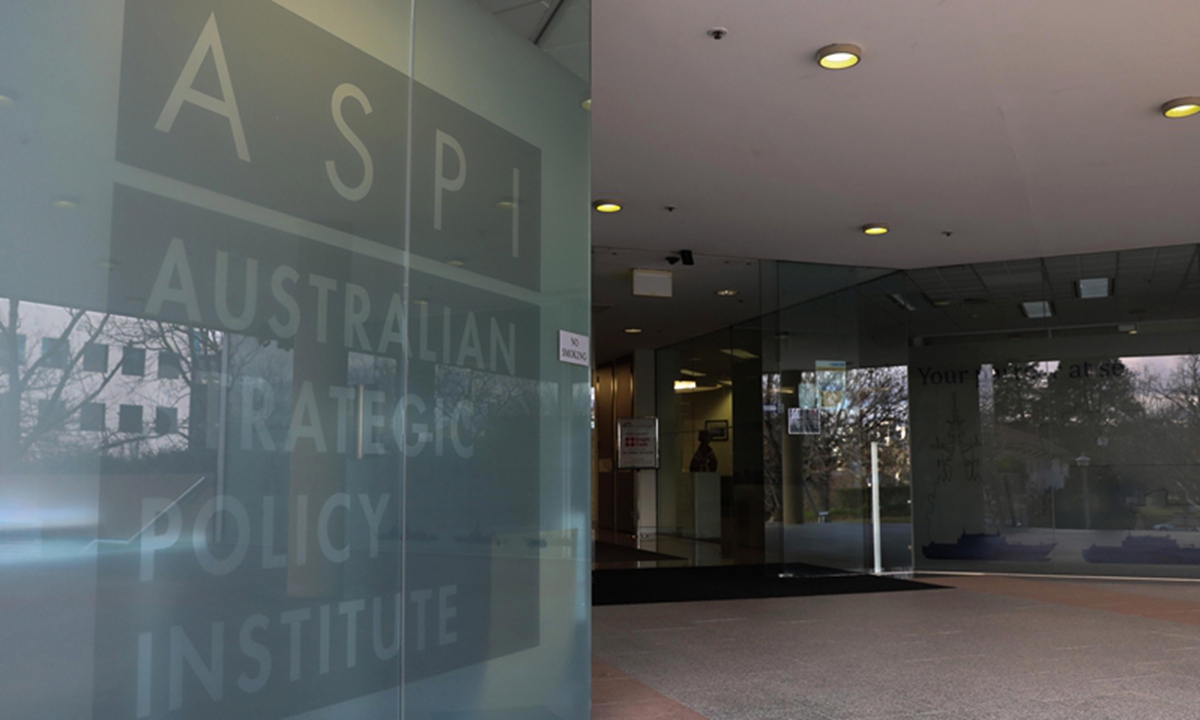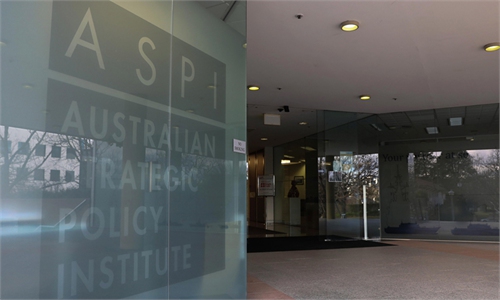
Photo taken on June 23, 2020 shows the logo of Australian Strategic Policy Institute in an office building, in Canberra, Australia.Photo:Xinhua
A new study released Wednesday by the Australian Strategic Policy Institute (ASPI) claimed that China is using "social media and a disinformation campaign to project its preferred narratives about Xinjiang and influence unwitting audiences around the globe." This is the latest attempt by the Canberra-based think tank at attacking the Chinese government over its Xinjiang policy.ASPI has been "concerned" about the situation in Xinjiang for years. It has played a significant role in spreading lies about Xinjiang in the international public opinion arena. Since 2018, the organization's Xinjiang Data Project has already published at least 167 "reports," "investigations," and "essays" based on the lies regularly concocted by the institute.
After analyzing one of ASPI's Xinjiang-related reports, Australian scholar Jaq James has found numerous lies and fallacies in many of ASPI's claims. "The ASPI report was not a work of scholarly analysis, but rather a piece of strategic disinformation to exact harm," she wrote in a report.
At the same time, the Australian think tank published work of anti-China "scholars," such as Adrian Zenz, who has been an enthusiast forger of lies. It can be said that the organization has long lost its academic integrity.
Moreover, all ASPI Xinjiang reports are deeply ideologically biased against China and use pre-determined political stances to attack and smear the Chinese government.
According to Ning Tuanhui, an assistant research fellow at the China Institute of International Studies, if ASPI was considered a conservative think tank or a right-wing think tank in the past, it now has completely transformed into an anti-China vanguard in the West. The Chinese Foreign Ministry has also repeatedly criticized ASPI for being excessively "enthusiastic about cooking up and sensationalizing anti-China topics."
Behind ASPI's disinformation campaign stand Washington and Canberra. The think tank's 2021 Annual Report shows that 69.2 percent of its annual revenue comes from funds of the Australian government, including the country's Department of Defense, and defense industries, while 18.3 percent comes from foreign government agencies. The two biggest funding payments from overseas government agencies are both from the US Department of State. Among them, one funding serves the purpose of setting agenda on such issues as Xinjiang human rights.
As the West increases its confrontation with China, ASPI has already become a megaphone for the West, especially the US and Australia, to promote an anti-China disinformation campaign and motivate more countries to confront China. In general, ASPI's clear values-oriented approach has made it even more difficult to believe the organization's claims.
In recent years, ASPI has already made up various Xinjiang-related claims, including those concerning "forced labor," "forced sterilization of Uygur women," "mass internment camps," and "cultural genocide." Now ASPI suggests that China uses its "state propaganda" to silence governments, businesses, and civil society over Xinjiang-related issues.
The recent ASPI Xinjiang report found out the silence of governments mostly comes from "Muslim-majority and non-Western countries." It said 55 of the 57 member states of the Organisation of Islamic Cooperation had not condemned China for its policies in Xinjiang, an example of the success of the so-called Chinese propaganda.
The "rumormonger" ASPI, apparently, is inverting both cause and effect. There is silence in the Islamic world not because those countries were "brainwashed" by China. Instead, it is because with a majority of the Muslim population, they have a far more realistic and objective knowledge of Xinjiang than most Western nations. They understand there is nothing wrong with China's Xinjiang policy, so they don't jump on the West-led Xinjiang-smear bandwagon.
Some Western elites keep labeling China's reasonable rebukes over Xinjiang-related smears as "propaganda" and those silent countries as "victims of China's propaganda." They only want to see what they want to see and completely refuse to hear China's voice. This has been proven by the West's constant efforts to mute China from voicing its stance on Western social media, a flat contradiction to the freedom of speech that the West has always advocated.
However, it is expected that disinformation about Xinjiang will gradually lose its market in the future. "As Xinjiang keeps developing and the international community knows more about the reality of Xinjiang, smears on China's Xinjiang policy will only become less and less convincing, and those unfamiliar with Xinjiang will no longer be easily influenced by such nonsense," said Ning.
We cannot anticipate lie-spreaders, such as ASPI, to stop smearing China. But as their claims are proven wrong again and again, hopefully, their buzzes will soon be completely ignored by the whole world.

